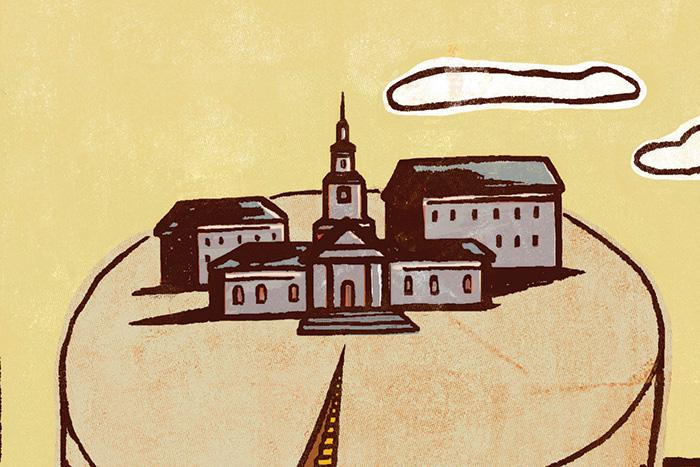Seeds & Success

Nasir Ellis '15 (photo by Carl Socolow '77)
Community-based organizations drive access and excellence
by Erin Owens '15
“It was raining the day I came to Dickinson for the first time,” Nasir Ellis ’15 recalls, “and I decided I didn’t ever want to come back.”
Ellis did return to Dickinson his senior year at Thurgood Marshall Academy, however, for what he assumed would be his last visit as a prospective student. This was when he fell in love. The campus was beautiful, students were out and about and Ellis knew Dickinson was where he needed to be.
The path to his decision had not been an easy one. Ellis was a graduate of StreetSquash, a community-based organization in New York City that works with promising students from disadvantaged socioeconomic backgrounds. Founded in 1999, the organization provides academic tutoring, squash instruction, community service, college preparation, leadership development and mentoring for public school students. What he had once called a “boring, loser sport” was now a priority for him.
Although Dickinson at the time didn’t have an NCAA squash program (it launches fall 2014), Ellis decided to give the school a shot. And as a first-year student, he took the opportunity to help Dickinson build the program, even participating in planning discussions about the Kline Athletic Center’s renovations. Last year, Ellis visited high-school squash programs in Baltimore with Stephanie Balmer, vice president for enrollment, marketing and communications and dean of admissions, and Cotten Seiler, associate professor of American studies, to share his experience.
According to recent studies on higher-education access, low-income high-school students from low-income families—even those with promising grades and high SAT scores—are less likely to apply to selective colleges. Because they lack access to a network of other students, family members, college counselors and teachers familiar with liberal-arts institutions, these students often are not aware that colleges like Dickinson—with the right combination of scholarships and other financial aid—can be more affordable and a better academic fit.
It’s a tricky problem to draw these high achievers to the best schools, however. It’s not feasible, for example, for admissions counselors to visit every high school in the country. The answer is often in college-access programs like StreetSquash and other community-based organizations, and students and alumni acting as representatives in their own communities.
“Community-based organizations and multicultural recruitment are opportunities to seek qualified students of color or students who have been historically underrepresented in higher education,” says Alan Paynter, assistant director of admissions and coordinator of multicultural recruitment. “They are phenomenal opportunities because they work with students who could be great fits for Dickinson. Otherwise, we wouldn’t know about them, and vice versa.”
One of Dickinson’s first outreach efforts was through the Posse Foundation, a national organization that identifies, recruits and works with students who have the academic and leadership potential to succeed at selective schools. Dickinson enrolled its first Posse cohort from New York City in 2001 and began working with Posse Los Angeles several years later. The college also has been seeking and forming partnerships with similarly successful organizations around the country.
As Ellis illustrated with his trip to Baltimore, one of the best outreach strategies is for Dickinson students to be “ambassadors for our education.” This is why, Ellis says, he works for admissions as a multicultural volunteer and participates in the Take Dickinson Home program.
He sees it as his responsibility as a Dickinsonian to spread the word. “Dickinson gives us the chance to discover how to think and to learn so many things that will prepare us to go out into the world and tackle big issues,” he says. “Without StreetSquash, I wouldn’t have heard about Dickinson.”
Diamond McClintock ’14 has similar beliefs when it comes to reaching out and presenting what the liberal arts can offer. As the multicultural recruitment intern, she works with potential students every day. This fall, McClintock also helped organize Dickinson’s Diversity Open House, an admissions visit program for high-school students of color. “I feel really invested in these students’ lives,” she says, “more than I thought I would be.”
McClintock, a New Jersey native who was accepted to New Jersey SEEDS at the end of fourth grade, also learned about Dickinson through a community-based organization. A statewide nonprofit organization that works with low-income students, New Jersey SEEDS works to ensure that their students enroll in college. A participant in the Young Scholars Program, McClintock attended summer and weekend academic-enrichment programs throughout fifth and sixth grade. In seventh grade, she began attending the Pingry School, a private preparatory school.
McClintock believes that the partnerships that Dickinson has forged with so many organizations like StreetSquash and New Jersey SEEDS are crucial for the college. Students who come to Dickinson from these organizations are not only high achievers with natural leadership abilities, but their presence alone can transform campus culture.
“During the application process, we need to relay to diverse students that they can overcome any obstacles that come their way,” McClintock says.
In addition to serving as the multicultural recruitment intern, McClintock, an art & art history major, is a member of the Liberty Caps Society, a student interviewer in the Office of Admissions, a member of sorority Pi Beta Phi and the president of Red Devils Television Network (RDTV), Dickinson’s new student-run broadcast organization.
Ellis, an Africana studies major and sociology minor, is the founder of RDTV, serves on Student Senate as vice president for academics, is chair of the Public Affairs Committee and performs with Hypnotic, a hip-hop dance group.
“We have to promote the type of education that a liberal-arts school can provide for students,” Ellis says. “I feel like I’m the first person I know going down this path, but that is why it’s exciting.”
He pauses. “I love being here.”
Read more from the winter 2014 issue of Dickinson Magazine.
Published January 15, 2014